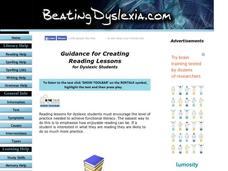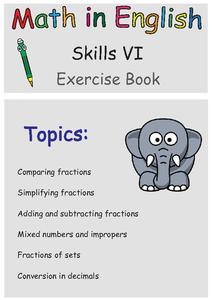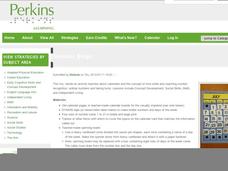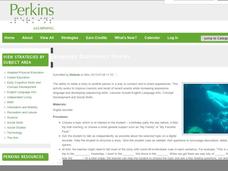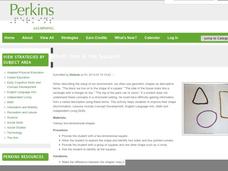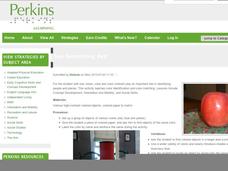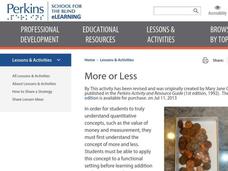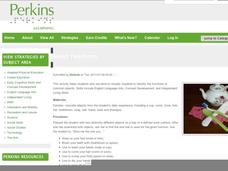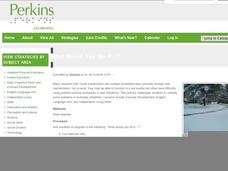Curated OER
Phonics Help: The Phonic Alphabetic Code Chart
Phonics is a fundamental key to reading success. To help your learners with dyslexia or learning disabilities, try using the phonic alphabetic code chart. The chart and full instructions on how it can be used in the classroom are...
Curated OER
How to Improve Eye Tracking to Make Reading Easier
Children with dyslexia may have issues with their eye tracking ability and this may cause problems when they read. Here is a set of three easy steps you can use to improve a learner's eye tracking. The idea is that some kids need help in...
Curated OER
Guidance for Creating Reading Lessons for Dyslexic Students
Here are a few practical tips and sound strategies you can use in writing effective reading lessons for your pupil with dyslexia. The resource provides simple guidelines and accommodations that can be incorporated into any lesson that...
Curated OER
Guidance for Creating Writing Lessons for Dyslexic Students
How do you help a child with dyslexia succeed as a writer? Here is a resource for those who need guidance in creating writing lessons for their students with dyslexia. It discusses research-based strategies that can be used and...
Curated OER
Daily Lesson Plan for the Struggling Writer and Speller
Special educators know that it isn't all about the lesson plan, but rather the strategies and practices you choose to use. Here are a set of research-based practices and tips you can use to inform your choices when teaching learners who...
Curated OER
Math in English Skills VI Exercise Book
If you need a comprehensive math packet specifically intended for learners who are struggling with fractions, look no further. Individuals will be able to practice comparing, simplifying, adding, and subtracting fractions in an enjoyable...
Perkins School for the Blind
Calendar Bingo
While this activity was designed for students with special needs, it could be used with any group learning about the calendar or days of the week. Old calendar pages become the bingo board, and numbers 1 through 31 become the numbers...
Perkins School for the Blind
Language Experience Stories
Here is a great way to bring core content to your special education classroom. Included is a set of instructional ideas intended to help learners increase their verbal and written expression through storytelling. Tape recorders, story...
Perkins School for the Blind
Where Shall I Put It?
Position and positional phrases are concepts that need to be constructed for learners with low or no vision. Help them gain competence and a conceptual understanding of words like on, in, and under with a funny game. After gathering a...
Perkins School for the Blind
3-D Task List
Staying organized is a part of growing up, and it can be as easy as making a list. Here is a set of instructions for making a three-dimensional task list especially for learners with visual impairments or blindness. After making the task...
Perkins School for the Blind
Which One is the Square?
Children who are blind need to constantly be engaged in building conceptual understandings of the world around them. This activity will help them grasp the concept of shape, identify shapes, and consider shapes as they are used to...
Perkins School for the Blind
Mix and Match
Sorting and matching are skills that have all kinds of applications. Learners with low, but useable vision work to match an object to an object, an object to a picture, and a picture to a picture. This will help them identify objects...
Perkins School for the Blind
Following Directions
Turn the act of following directions into a fun and engaging game! Especially designed for students with cognitive or intellectual disabilities, this lesson plan uses a game format as a natural reinforcer. Write a set of directions onto...
Perkins School for the Blind
Treasure Hunt
On, over, and under are some very common prepositions; but how can you teach these concepts to children with visual impairments? Here, is one way. Kids will practice following verbal commands as they go on a classroom treasure hunt. They...
Perkins School for the Blind
Student Store
Vocational training activities are extremely important for learners with intellectual or physical disabilities. Here is a great idea that will help your class become skilled at money handling, basic economic concepts, interpersonal...
Perkins School for the Blind
I See Something Red
For learners with low vision, the ability to identify colors is an important skill that will help them identify people and places. Groups of brightly colored objects are placed around the room. The child is then given a colored paper and...
Perkins School for the Blind
I'm Thinking Of...
Learning how to describe an object or a person is a great way to develop verbal and written expression. Learners with special needs improve their verbal expressive skills and concept development skills while playing a guessing game. The...
Perkins School for the Blind
Letter Confusion
Teaching a child with low or no vision how to read is the same as teaching a sighted child how to read — it all starts with letter recognition. This is a simple way to provide your learners with an opportunity to practice reading and...
Perkins School for the Blind
More or Less
The concept of more or less is one that needs to be mastered prior to learning other concepts such as quantitative analysis, addition, or subtraction. This activity provides several ways to teach learners with low or no vision to...
Perkins School for the Blind
Object Functions
What does that thing do? For learners with low or no vision, understanding an object's function is a necessary skill. Here learners handle a number of objects and are asked to determine which object is for a specific task. They can feel...
Perkins School for the Blind
A Visit to the Doctor
Going to the doctor's office may be a source of stress and uncertainty for some children. Help your learners with special needs discover what to expect at and how to cope with their next trip to the doctor. They explore real medical...
Southern Illinois University
I Can Write a Poem
It is so important for English language learners to be able to write for a variety of purposes. Specifically written for an ELD class, this activity provides explicit instruction for teaching learners how to write a poem. First, they...
Perkins School for the Blind
What Would You Do If...?
What would you do if...? That's a great question, and, when posed to learners with visual impairments, a question that can foster concept development and speaking and problem-solving skills that relate to real-life situations. The...
Perkins School for the Blind
Silly or Sensible?
Is it silly or sensible? That's a great question, and it's the question that will drive this entire lesson. Learners with special needs and visual impairments work together to analyze verbal information. The instructor makes a statement,...




